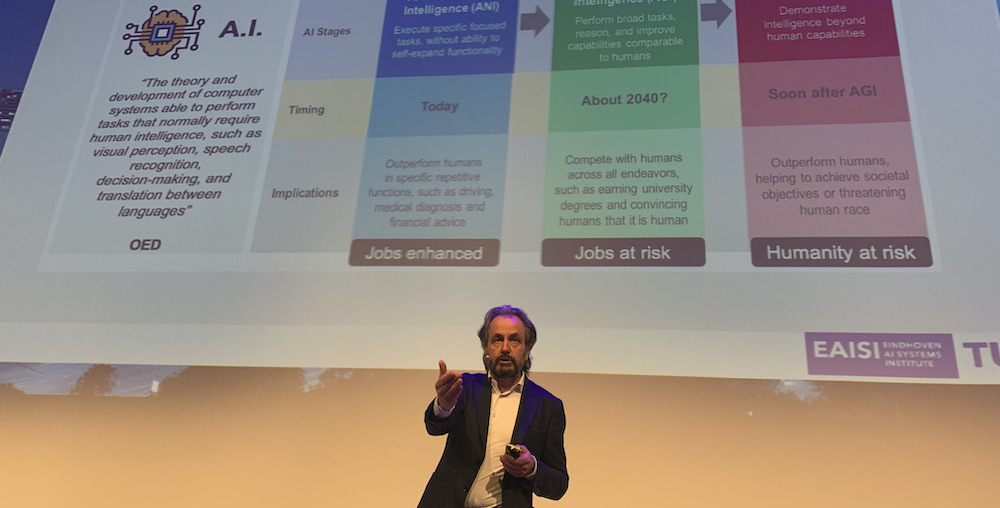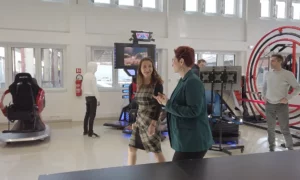(Editor’s note: This post about the promise and dangers of AI is part of our Tech Tuesday series. Dispatches covers tech and innovation because so many of our highly skilled internationals are scientists and academicians.)
At a sold-out talk Monday, Carlo van de Weijer set up the challenges of artificial intelligence to human dominance this way: Do we adapt the world to computers or adapt computers to the world?
Van de Weijer, general manager of the Eindhoven Artificial Intelligence Systems Institute at Eindhoven University of Technology (TU/e), presented “A future with AI; Who’s at the wheel?”, the title an allusion to the long-promised but never realized driverless car. The theme was also meant to evoke how people are going to control AI-enhanced machines, which he said will eventually acquire the power to out-think humans in the near future.
“AI is an exponential technology,” van de Weijer said. “By 2040, we will have computers with general intelligence, as smart as we are.” How humans control and exploit this artificial super intelligence technology will be the difference between machines working for us or humans working for machines, he said.
“Our human consciousness – soul, character – will not keep us ahead of AI.”
The risk, rewards of AI
The rapid evolution and adoption of AI presents humanity with numerous challenges but more opportunities, van de Weijer said. Still, he warned, it’s how humans deal with this always-advancing technology that will decide our fate. For some, AI represents accelerating wealth and progress. For others, it represents the possibility of becoming obsolete.
“AI won’t replace people but the people who can work with AI will replace those who can’t,” van de Weijer said.
There are three potential strategies to solve world problems, he said:
1 – Hope for the best.
2 – Consume less, de-growth, though it’s ineffective to take step backward, van de Weijer noted.
3 – “We can innovate our way out of trouble,” and that’s where TU/e comes in.
Van de Weijer’s presentation, while packed with information and data, was entertaining and definitely not pedantic. Something of a showman, the TU/e researcher peppered the hour-long presentation with humorous asides and observations as well as the AI-generated video he created of his speaking Italian and Greek … which he doesn’t actually speak.
It also featured several real film clips, including Steve Jobs talking about how the computer is “the bicycle of the mind,” amplifying human intelligence just as the simple bicycle gives us the ability to travel much faster than most other animals.
Van de Weijer’s point was the ability to develop tech puts us ahead of the other animals. “Now, our brains are supported by machines.” But even with artificial intelligence, those machines have real-world limitations and dangers.
Van de Weijer used video of a chaotic Amsterdam street corner (above) to illustrate why self-driving cars are still a pipe dream. Self-driving car technology simply can’t solve the totally random traffic patterns where vehicles, pedestrians and, of course, cyclists follow no predictable pattern
Amsterdam works on unwritten rules and people have brains that give them a flexibility in interpreting these rules, he said, to “color outside the lines. “
“In the real world, informal rules make it work,” while computers work best in a conditioned state. “Our only added value in the future is that we can color outside the lines.”
Humans have to institutionalize coloring outside the lines with rules governing artificial intelligence and his strong advice: “Let’s not allow AI to flexibly color outside the lines.”
If we do, then humans and machines will change places, van de Weijer said. “We’ll carry the boxes instead of the machines.”
Van de Weijer advocates uniform global rules and regulation of AI starting with the European Union AI Act. The legislation limits the use of AI, including social scoring, facial recognition, dark-pattern AI and manipulation via AI-generated images and video.
Infinite promise, infinite changes
While there are risks, AI has infinite promise to improve humans’ lives. It will never replace human workers, but AI can improve employee efficiency dramatically, he noted. As it makes advanced societies wealthier, it will increase demand for what he termed “desk-less jobs,” manual jobs than can only be done by skilled humans, according to van de Weijer.
“We’re going to get rich,” with more amenities and infrastructure, which will need more people to keep it all working, he said.
AI will also make antiquated industries such as farming more efficient, van de Weijer noted, and it will even change the nature of work: “AI will give us totally different jobs,” while enhancing the most creative ones, he said.
He used the example of an artist. “Tech didn’t take the job of painter. It just made their work more interesting,” using the increasing complexity of capturing and reproducing imagery over the centuries to illustrate his point.
He closed with a quote from the late American journalist Sydney J. Harris: “The real danger is not that computers will begin to think like humans, but that humans will begin to think like computers.”
(Editor’s note: Hilde de Vocht, marketing and communications manager at High Tech Campus Eindhoven, noted that van de Weijer’s presentation drew more than 450 requests for the 300 seats in the campus Conference Center, making it the most popular open lecture ever hosted at HTCE.)
Co-CEO of Dispatches Europe. A former military reporter, I'm a serial expat who has lived in France, Turkey, Germany and the Netherlands.















